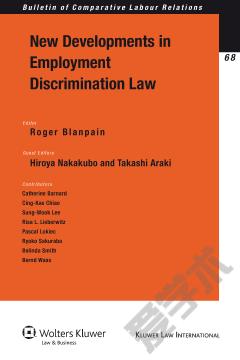New Developments in Employment Discrimination Law
No one doubts the evils of invidious discrimination, or that prohibition of employment discrimination is a valid cause. Formal anti-discrimination laws applicable to employment exist in many countries. Yet discrimination seems to persist, and substantive equality remains elusive, in employment as in other walks of life. What are legislators doing to close this gap? That is the central question addressed by the eight national employment law experts whose papers originally presented at the Ninth Tokyo Seminar on Comparative Labour Law, held in February 2008 are presented here in revised versions. The eight countries represented are the United States, the United Kingdom, Germany, France, Australia, Korea, Taiwan and Japan.The topics and issues examined by each national contributor include the following:a brief historic overview and notable recent developments;statutes to prohibit discrimination on grounds of race/ethnicity, sex, religion/beliefs, age, disability, sexual orientation and employment status (such as part-time and fixed-term contract);special laws regarding wages, such as equal pay between men and women; constitutional basis for anti-discrimination statutes;typical cases of employment discrimination;justifiable grounds for distinction or disparity;so-called indirect discrimination;comparison of treatment of newer types of discrimination (e.g. age, disability, employment status) with treatment of traditional ones (e.g. race, sex);important issues of remedial procedure regarding employment discrimination cases;relationship between employment discrimination law and employment policy considerations;effect on employment practices of age discrimination and employment-status discrimination laws;measures to promote employment of elderly or disabled people;merits and demerits of addressing employment issues from the standpoint of ‘discrimination’;and the most important issue of employment discrimination in each country todayThis book demonstrates that, while the growing importance of this area is commonly observed, there are differences in specific grounds covered by law and in the legal and societal contexts in which they came to be addressed. Nonetheless, it is definitely necessary and beneficial to learn from the systems and actual experiences of other countries, and these detailed descriptions and analyses provide invaluable information for this purpose for both practitioners and academics.
{{comment.content}}








 京公网安备 11010802027623号
京公网安备 11010802027623号